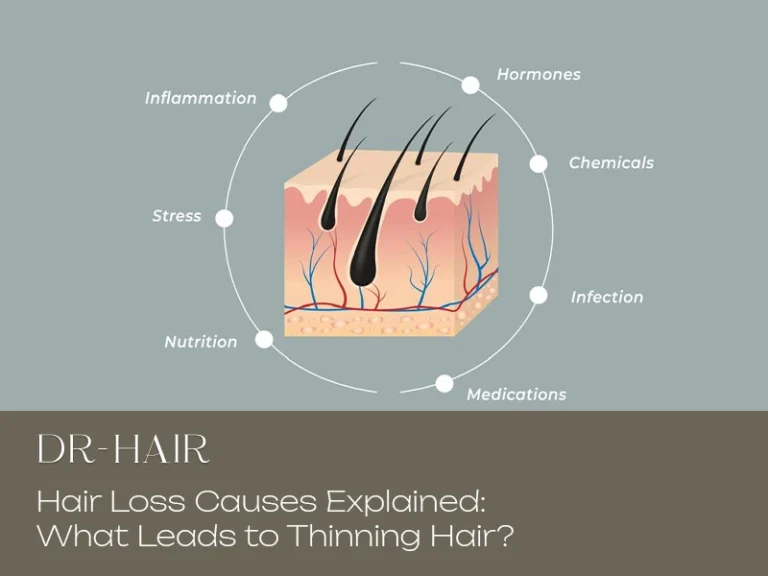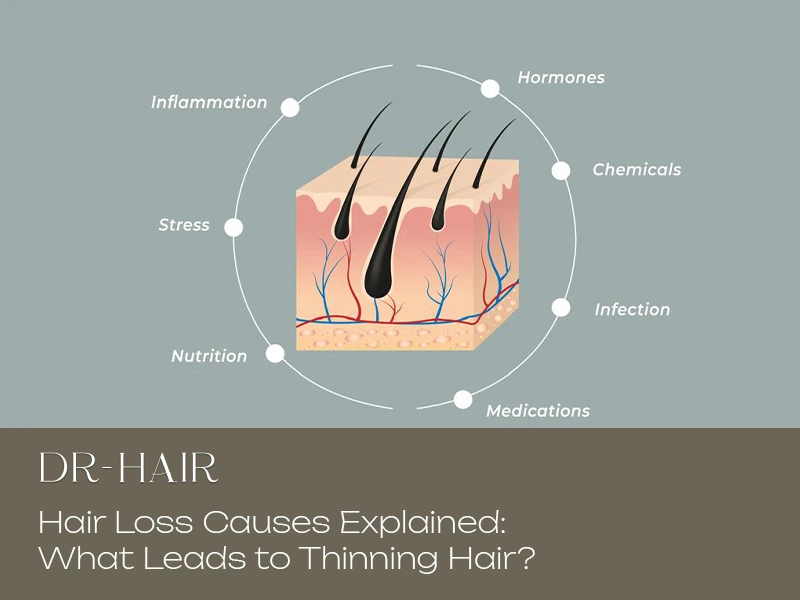Hair Loss Causes
Hair loss is a common problem that affects millions of people worldwide. While the reasons behind hair loss can vary greatly, understanding the hair loss causes is the first step toward addressing it effectively. Hair loss is often linked to a range of factors such as hormonal imbalances, chemical exposure, infections, medications, poor nutrition, stress, and inflammation. In this blog post, we will explore the various hair loss causes, provide insight into each factor, and discuss potential treatments. Additionally, we’ll answer some frequently asked questions.
Understanding Hair Loss
Hormonal Changes
One of the primary hair loss causes is hormonal imbalance. Hormones play a crucial role in regulating hair growth, and fluctuations in hormones can significantly affect hair health. Conditions such as androgenic alopecia (male-pattern baldness or female-pattern hair loss) are often the result of an excess of dihydrotestosterone (DHT), a byproduct of testosterone. This hormone can shrink hair follicles, leading to thinner hair and eventual hair loss.
For women, hair loss causes can also include pregnancy, childbirth, and menopause. During pregnancy, hair may become thicker due to hormonal changes, but after childbirth, many women experience hair shedding due to the drop in hormone levels. Similarly, menopause leads to a decrease in estrogen, which can trigger hair thinning.
Treatment for Hormonal Hair Loss:
Minoxidil: A topical solution to stimulate hair growth.
Finasteride: A medication that inhibits DHT production in men.
Hormone Replacement Therapy (HRT): Used for women experiencing hair loss due to menopause.
Chemical Damage
Chemicals used in hair treatments are another common hair loss cause. Hair dyes, perms, and relaxers contain harsh chemicals that can weaken hair and make it more prone to breakage. Excessive use of these chemicals can lead to thinning hair and hair loss. Chemical treatments strip the hair of its natural oils, leading to dryness and fragility, which contributes to hair loss causes.
Treatment for Chemical Damage:
Moisturizing treatments: Using hydrating conditioners and hair masks.
Avoiding harsh chemicals: Switching to gentler or natural alternatives.
Protein treatments: Strengthening the hair shaft with keratin products.
Scalp Infections
Infections of the scalp are also significant hair loss causes. Fungal infections, such as ringworm, or bacterial infections can damage hair follicles, leading to hair loss. Alopecia areata, an autoimmune disorder, also results from an abnormal immune system response that attacks hair follicles, causing patchy hair loss.
Treatment for Scalp Infections:
Antifungal shampoos: For fungal infections like ringworm.
Topical corticosteroids: To reduce inflammation in the scalp.
Oral antibiotics or antifungals: For more severe infections.
Medications
Certain medications are a common yet often overlooked hair loss cause. Medications used to treat conditions such as high blood pressure, depression, arthritis, and cancer can cause hair loss as a side effect. Chemotherapy drugs are one of the most well-known medications that lead to hair shedding, as they target rapidly dividing cells, including hair follicles.
Medications That Can Cause Hair Loss:
Chemotherapy drugs: Often cause temporary hair loss.
Beta-blockers: Used for heart problems.
Antidepressants: Certain antidepressants may cause hair thinning.
Treatment for Medication-Induced Hair Loss:
Consulting a doctor: To explore alternative medications.
Minoxidil: To promote hair regrowth after discontinuing medication.
Lifestyle changes: Incorporating healthy habits to support hair growth.
Poor Nutrition
Another significant hair loss cause is poor nutrition. Nutritional deficiencies can weaken hair, causing it to become brittle and prone to shedding. For instance, deficiencies in iron, vitamins (such as B12 and D), and protein can lead to hair loss. Iron deficiency, in particular, is one of the most common nutritional causes of hair loss in women.
Nutritional Deficiencies Linked to Hair Loss:
Iron deficiency: Can lead to thinning hair.
Zinc deficiency: Often associated with hair loss.
Biotin deficiency: Can cause hair breakage and thinning.
Treatment for Nutritional Hair Loss:
Dietary changes: Incorporating iron-rich foods like spinach and lentils.
Supplements: Taking biotin, zinc, and vitamin D supplements.
Balanced diet: Ensuring a nutrient-rich, varied diet.
Stress
Stress is a major factor contributing to hair loss causes. Chronic stress triggers the release of the hormone cortisol, which can disrupt the normal hair growth cycle. The result is often telogen effluvium, a condition where hair prematurely enters the shedding phase. Emotional or physical stress, including trauma or illness, can trigger this form of hair loss.
Treatment for Stress-Induced Hair Loss:
Stress management: Using techniques like meditation, yoga, and deep breathing.
Exercise: Regular physical activity helps lower stress levels.
Adequate sleep: Ensuring enough rest can help reduce cortisol levels.
Inflammation
Scalp inflammation is another of the major hair loss causes. Inflammatory conditions such as psoriasis and seborrheic dermatitis can damage hair follicles, leading to hair loss. Inflammation prevents hair follicles from producing healthy hair and may cause hair to fall out.
Treatment for Inflammatory Hair Loss:
Corticosteroids: Used topically to reduce scalp inflammation.
Anti-inflammatory shampoos: Designed to soothe irritation and reduce hair loss.
Systemic treatments: For severe cases of inflammation.
Frequently Asked Questions
What are the common hair loss causes for women? Hormonal changes due to pregnancy, menopause, and androgenic alopecia are the most common hair loss causes in women.
Can stress really cause hair loss? Yes, chronic stress can lead to telogen effluvium, a condition that causes significant hair shedding.
Is hair loss reversible? Depending on the hair loss cause, many cases are reversible, particularly if the cause is temporary, such as stress or medication-induced shedding.
What treatments are available for hair loss causes in Malaysia? Common treatments include minoxidil, hair transplants, and PRP therapy.
How can I prevent hair loss naturally? Managing stress, eating a balanced diet, avoiding harsh chemical treatments, and using gentle hair care products can help prevent hair loss causes.
Conclusion
Hair loss can be caused by a variety of factors, including hormones, chemicals, infections, medications, poor nutrition, stress, and inflammation. While some forms of hair loss are temporary and reversible, others may require ongoing management. By understanding the root causes and exploring available treatments, you can take proactive steps to manage and mitigate the effects of hair loss. Always consult a healthcare professional to determine the most appropriate course of action for your specific situation.

